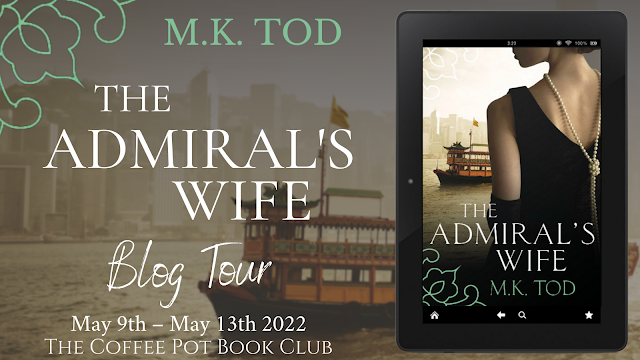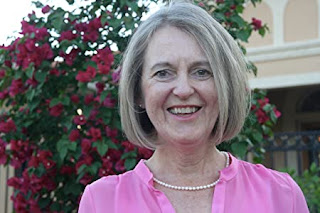The Admiral’s Wife
By M.K. Tod
Publication Date: 11th April 2022
Publisher: Heath Street Publishing
Page Length: 390 Pages
Genre: Dual-Timeline
The lives of two women living in Hong Kong more than a century apart are unexpectedly linked by forbidden love and financial scandal.
In 2016, Patricia Findlay leaves a high-powered career to move to Hong Kong, where she hopes to rekindle the bonds of family and embrace the city of her ancestors. Instead, she is overwhelmed by feelings of displacement and depression. To make matters worse, her father, CEO of the family bank, insists that Patricia’s duty is to produce an heir, even though she has suffered three miscarriages.
In 1912, when Isabel Taylor moves to Hong Kong with her husband, Henry, and their young daughter, she struggles to find her place in such a different world and to meet the demands of being the admiral’s wife. At a reception hosted by the governor of Hong Kong, she meets Li Tao-Kai, an influential member of the Chinese community and a man she met a decade earlier when he was a student at Cambridge.
As the story unfolds, each woman must consider where her loyalties lie and what she is prepared to risk for love.
“Family secrets and personal ambitions, east and west, collide in this compelling, deeply moving novel."
Weina Dai Randel, award-winning author of The Last Rose of Shang-Hi
“Irresistible and absorbing.”
Janie Chang, bestselling author of The Library of Legends
“But it’s your fault I’m American.”
Patricia Findlay heard the pinch of exasperation in her voice and smiled at her father to reduce the sting of her words. The arrogant way he looked at her over the brim of his reading glasses made her think of an aging monarch guarding his empire. And this wasn’t far from the truth. Li Jianyu was the major shareholder of Lotus Commercial Bank, one of Hong Kong’s largest commercial banks. He was a heavyweight in Asian financial markets. If she wanted to work in banking, her father’s connections were crucial.
How had an innocent remark about having coffee with two American women created conflict between them already?
“You aren’t American, you’re Chinese,” her father said, his lips flattening, which she’d learned as a child was a clear sign of displeasure. “Li Mingyu, not Patricia Findlay. It offends me that you don’t use your proper name.”
They were speaking Cantonese, which put her at a disadvantage. Although fluent as a young child, Patricia had lived her entire life in the U.S. and had lost proficiency in speaking the language. As for reading it, she only knew a few of the three thousand characters in everyday use.
“And does my husband offend you too?” Patricia said. “He’s a proper American with a proper American name.” She spoke without thinking and instantly regretted her words.
Her father raised his chin and glared, his black eyes sharp and penetrating as if he wanted to squeeze her soul with his bare hands. He was accustomed to having his way. After so many years apart from him, Patricia thought herself immune to his brand of coercion and control. Yet here they were arguing already, just like they always had.
A year earlier, when Patricia and her husband Andrew had been planning the move to Hong Kong, she hadn’t imagined how difficult it would be to leave everything behind—her demanding job, an intimate group of friends, her husband’s two children, her mother- and father-in-law, who in many ways had become closer than her own parents. Nor had she imagined how disorienting Hong Kong would be.
It was at about the five-month mark when Patricia’s enthusiasm had screeched to a halt, replaced by loneliness and depression and the realization that her life had spun out of its orbit. The gravitational pull of her personal sun and planets—Andrew’s children, her friends, her work, and the city she’d lived in for fifteen years—had disappeared. Other than Andrew, her brother David, and her parents, she was left with nothing familiar, no touchstones to buoy her spirits, no sense of purpose.
In this strange, new world, she wanted her father’s help to regain at least one familiar element of her life. Patricia had enough connections to find a job with one of the western banks located in Hong Kong, but she wanted to experience the Asian banking world. Furthermore, working at Lotus Commercial Bank—LCB—would offer an opportunity to demonstrate her skills to her father and earn his respect. Ultimately, when the time came for her father to step down, she would be able to contribute in a meaningful way.
She loved her father. She really did. She admired his dedication to family, his business acumen, his fierce loyalty to Chinese culture. As a little girl, she had done everything she could think of to compete with her older brother and earn her father’s approval. During her teenage years, he had acknowledged her academic achievements and, unlike Patricia’s mother, encouraged rather than criticized. It was her insistence on remaining in the U.S. that had set them on a collision course.
“Andrew no longer offends me,” her father said. “In the banking world, having an American son-in-law is proving to be an asset.” A thin smile crossed his face. “If he spoke our language better, he would be even more valuable.”
“Is that all people are to you, Ah Ba? Assets or liabilities? I suppose you consider your son a liability.” Why do I always confront him? Nothing good will come of the conversation now.
Li Jianyu removed his glasses and set them next to the bonsai display anchoring one corner of his desk. The black ceramic dish contained pure white sand, a few artfully placed rocks, and a miniature tree leaning heavily to one side as if buffeted by endless winds. There were many days when Patricia felt like that tree.
“Your brother has chosen a different path,” her father said. “I don’t approve of his lifestyle, but a son is a son. And he’s my heir. Perhaps if you’d returned home earlier, his situation would be different.”
Patricia closed her eyes. She took a slow breath in and exhaled completely, a calming technique she’d learned at qigong. “You can’t blame me for David’s ‘lifestyle,’ as you call it. People don’t choose to be gay, Ah Ba. They’re born that way. Whether I lived in New York or Hong Kong, he would still be gay.”
Regardless of the original topic, their conversations often collapsed into the same ratholes—family duty, Chinese superiority, America’s flawed culture, her brother’s way of life. Her father agonized about the future of the bank that his grandfather had founded, and a small part of Patricia sympathized with his disappointment that his only son was gay—a man who would never produce an heir, unless one of her father’s schemes to trick David into marriage proved successful.
As a young adult, Patricia had been the one who wanted to follow her father into business, and at first this had pleased him. When her parents and David left the U.S., she had argued that industry connections and knowledge of American practices would be valuable to the family bank. Her father had reluctantly agreed, and she’d taken a job with Bank of America after graduation. By any measure, her success had been impressive, and as time unfolded, she’d been seduced by opportunities to further her career while resisting her parents’ pleas—her best friend Lesley called them commands—to come home. As far as Patricia was concerned, home had never been Hong Kong. Home had been Chicago, San Francisco, and then New York, where she’d met Andrew Findlay.
Marrying outside her family’s culture and ethnicity had been a severe blow to her parents. During one acrimonious phone call, her father had declared that he was ashamed of her. He’d called her a traitor, a schemer, and a disappointment. After that, they hadn’t spoken for months. It was only Andrew’s efforts to placate her mother and father that had brought about an uneasy truce.
“If you hadn’t been so rebellious, your brother might have taken up a normal life,” her father said now. “You took all the attention away from him. Your mother agrees with me.”
Patricia stifled the obvious rebuttal. “Well, that’s not why I came to see you this morning, Father.” She deliberately used a more formal term of address. “Andrew and I moved to Hong Kong, just as you wanted. We’ve settled in now and I’m grateful you’ve given him a senior role at the bank—”
“But,” her father interrupted, joining his fingers together beneath his chin like a skeptical lawyer.
“Yes, Father, there’s a but.” She took another calming breath. “I have nothing to do. If there isn’t a role for me here at the bank, can you help me find a job somewhere else? You have so much influence in Hong Kong. You can’t expect me to go from an all-consuming career to being a housewife. I’m your daughter. I need—”
He interrupted again. “Your mother does a superb job of looking after our home and social life. Why shouldn’t I expect you to do the same?”
Patricia could never live like her mother—days full of shopping, attending ceremonial teas, receiving reflexology treatments, arranging flowers, visiting ancestral graves, planning twelve-course dinners, consulting with the housekeeper, the cook, and the gardener. Her mother was a true tai tai, a woman of privilege with money to spend and lots of leisure time. As far as Patricia was concerned, those activities filled up the hours but offered no challenge, no feeling of contribution, and nothing to nourish the spirit.
She rose and, as she walked towards the window, touched her father’s prized possessions: a jade Buddha that had once belonged to her great-grandfather; the life-sized figure of a warrior from Xian; a lacquered prayer table, which her father claimed was more than a thousand years old. In one corner of the office, a waterfall spilled down miniature granite steps with a gentle trickling sound. She knew that each of these had been selected and positioned according to feng shui principles to honor both past and future power.
Patricia picked up one of the black stones from her father’s Go board and fingered its smooth surface, an action she knew would irritate him. “Because you raised me to have different expectations,” she said at last, while gazing at the commanding view of mountains, skyscrapers, and a bustling, boat-filled harbor. “Because you encouraged my interest in banking. Because I’m . . .” She’d been about to say, “Because I’m like you,” but she hated the thought that she could ever be as ruthless and manipulative as her father. “Because I’m your daughter.”
M.K. (Mary) Tod’s interest in historical fiction began as a teenager immersed in the stories of Rosemary Sutcliff, Jean Plaidy, and Georgette Heyer. In 2004, her husband’s career took them to Hong Kong where, with no job and few prospects, Mary began what became Unravelled, her first novel. The Admiral’s Wife is her fifth novel.
Mary’s award-winning blog, www.awriterofhistory.com, focuses on reading and writing historical fiction. She’s an active member of the historical fiction community and has conducted five unique reader surveys on topics from readers’ habits and preferences to favorite historical fiction authors. Mary is happily married to her high-school sweetheart. They have two adult children and two delightful grandsons.
Connect with M.K. Tod:
Website • Blog • Twitter • Facebook • LinkedIn • Instagram • BookBub • Amazon Author Page • Goodreads









Many thanks for hosting an excerpt from The Admiral's Wife. It's a delight to be on tour with you!!
ReplyDeleteGreat excerpt, it really makes you want to read on.
ReplyDeleteJust what an author loves to hear! Many thanks :-)
Delete